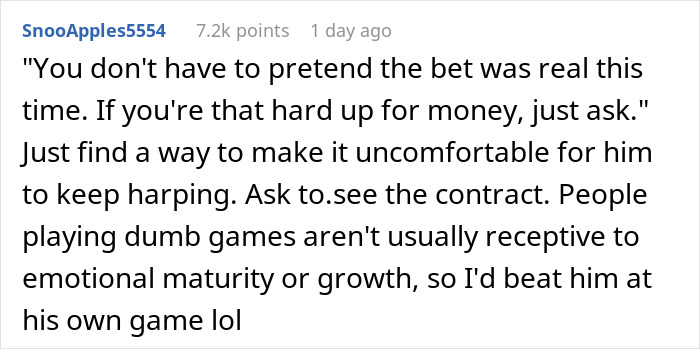I’ll bet you an iced latte that I canruna mile faster than you. I’ll bet you $10 that your favorite boxer is going to get knocked out in the sixth round on Saturday. And I’ll bet you a nice dinner that I’m going to listen to more minutes of music on Spotify than you this year!
Bets betweenfriendsare often silly and not always taken seriously. They’re just meant to be a bit of friendly competition; they shouldn’t have the power to destroy relationships. But when one man finally lost a bet to a friend who had lost dozens over the years, he was shocked to find out that he was expected to pay up. Below, you’ll find the full story that was recentlypostedon Reddit, as well as a conversation with Kristen Fuller, MD, Medical Writer forAddiction Center.
RELATED:
This man’s friend has lost dozens of casual bets over the years

Image credits:Zinkevych_D / envato (not the actual photo)
But when he finally won one, he was suddenly serious about getting his payment

Image credits:Karolina Kaboompics / envato (not the actual photo)

Image credits:F0000r
“Betting and gambling both produce surges of dopamine which stimulate the brain’s reward center”
To learn more about betting and how it can turn into a compulsive behavior, we reached out toKristen Fuller, MD, Medical Writer forAddiction Center. Dr. Fuller was kind enough to have a chat withBored Pandaand discuss the differences between betting and gambling.
“’Betting’ and ‘gambling’ are often used interchangeably in the gambling world and are very closely connected but with a slight difference,” the expert shared. “Bettingtypically refers to placing a wager on sporting events whereas gambling refers to placing a wager on card games or the lottery. Betting is often done at horse races or sporting events, whereas gambling is often done atcasinos.”
However, Dr. Fuller says betting can fall into the same category as gambling in terms of addictive behaviors, “as both are compulsive acts that stimulate the brain the same way as drug addiction stimulates the brain.”
“Betting and gambling both produce surges of dopamine which stimulate the brain’s reward center, and once this dopamine is depleted, the individual will seek to engage in behaviors that continue to increase levels of dopamine, even if gambling and betting affect their life in a negative way,” she explained.
We were also curious about some of the signs that someone may be addicted to betting. Dr. Fuller says to be on the lookout for compulsive behavior. “Excessive gambling despite the negative consequences it may have on finances or relationships,” she noted. “A person may spend hours a day betting, may constantly think about betting, may cancel plans and obligations so they can engage in betting, will borrow or steal money, lie, hide their behavior etc. They will continue to place bets even if they are financially in trouble.”
Addiction to betting can take a huge toll on a person’s life
Loss of control is another red flag. “People who areaddictedto betting/gambling have a hard time stopping and will go to extreme behaviors such as spending excessive amounts of money or borrowing other people’s money without any regard for other responsibilities or people in their life,” the expert noted. “Even if they are made aware that their actions and behaviors are hurtful and harmful to their loved ones, they still have extreme difficulty stopping their addiction without seeking professional help.”
Neglecting responsibilities can be another concerning sign of addiction. “People addicted to betting may skip deadlines, forget to pay their bills, call in sick to work, cancel important time with loved ones, etc.,” Dr. Fuller says.
And of course,addictionis almost never harmless. “Gambling/betting addiction can lead to financial hardship such as job loss, debt, loss of a house, etc. It can also lead to relationship problems such as divorce, losing child custody battles, losing important friendships and relationships with family members,” the expert told Bored Panda.
“It can lead to legal troubles, as addiction to gambling/betting can result in theft, or trouble with ‘loan sharks.’ Gambling/betting addiction can also take a toll on your mental health resulting in anxiety, depression, and huge mood fluctuations that relate to losing and winning,” Dr. Fuller continued. “It can also lead to substance abuse, low self-esteem, difficulty sleeping, guilt, shame and poor decision making. The stress of being in debt itself can take a huge toll on your mental health.”
“Compulsive gambling/betting is a behavioral addiction, and like any other addiction, professional help is often warranted”
So how can someone go about breaking their gambling or betting addiction? “Compulsive gambling/betting is abehavioral addictionand like any other addiction, professional help is often warranted,” Dr. Fuller shared. “This can come in the form of online therapy, gambling support groups, outpatient or inpatient treatment and important individual self-help techniques.”
“The first thing you can do is to delete/turn off all your sports betting accounts, ask sports betting organizations to close your account permanently, fill out self-exclusion forms that prohibit you from gambling and ask loved ones to help you manage your finances or even oversee your finances while you are going through this period,” she continued.
“Therapists will offer cognitive behavioral therapy which address the negative thought patterns associated with betting/gambling.Gamblers Anonymous(GA) is a nationwide support group for people struggling with betting/gambling and offers in person and online meetings,” the expert added.
Later, the man provided some more background info


















Thanks! Check out the results:You May LikeMan Accuses “Terrible” Sister Of Prioritizing Her Dog’s Life Over His Career, Family AgreesGabija PalšytėWoman Thinks It’s Not Fair To Split The Bill For Meal She Didn’t Eat, Gets A Reality CheckRugile Baltrunaite“Learned The Hard Way To Never Give Her Cash”: Woman Gives Sister An Ultimatum For $40Rugile Baltrunaite
Gabija Palšytė
Rugile Baltrunaite
Relationships